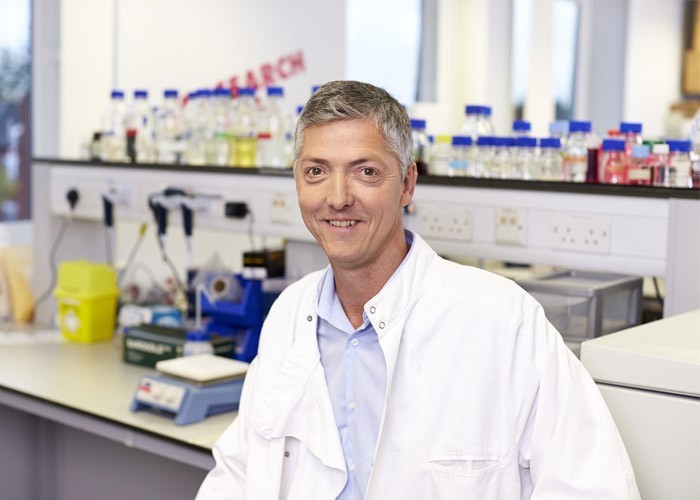We hear from Professor Rob Clarke, a Breast Cancer Now researcher based at the University of Manchester. He shares how the work in his lab restarted after over a three-month closure due to COVID-19.
We hear from Professor Rob Clarke, a Breast Cancer Now researcher based at the University of Manchester. He shares how the work in his lab restarted after over a three-month closure due to COVID-19.

Professor Rob Clarke is a Breast Cancer Now researcher based at The University of Manchester. He is studying how breast cancer spreads to the bone, where it becomes incurable, and wants to find ways to prevent it. Rob’s lab had to close at the end of March following government guidelines and remained closed for over 100 days. Now, he is back in the lab and we caught up to hear more.
What is your research about?
My research is focused on understanding the molecular detail of how breast cancer spreads to the bone. It’s one of the most common places for the disease to spread to. When it spreads, it’s called secondary (or metastatic) breast cancer, which can be controlled for a while, but can’t be cured.
I want to understand what molecules and pathways help breast cancer cells settle in the bone and what we can do to stop it. Last year, we made a discovery that arthritis drugs could prevent breast cancer from spreading to the bone. Now, it’s important that we further understand their effects on breast cancer so that these drugs can be tested in clinical trials.
How has your research been affected by the COVID-19 pandemic?
My lab was closed for over 100 days due to the pandemic, which forced us to interrupt the experimental work in this project.
While the lab was closed, I was busy throughout working from home. I was writing reports on projects that were complete and planning new projects for when the lab closures were lifted. We also published two scientific papers. It was a major success as additional experiments are usually requested when research papers are reviewed for publication.
In addition, I wrote five applications for research funding from different sources. I had one funded and one that remains short-listed for funding. Unfortunately, three were turned down due to insufficient funds even though they were short-listed for review.
What arrangements did you have to make to safely return to the lab?
The University of Manchester has strict social distancing guidelines for a safe return to the labs. There is a limit of 25% occupancy in the lab spaces, we’re not having any face-to-face meetings and currently everyone must work from home unless absolutely necessary.
It means that we can access the lab only to carry out experiments. All data analysis and writing is happening from home. All our meetings are via video conference, which we are well used to after the last four months of lockdown.
It also means we have to prioritise our work more than ever. The priority has been to resume lab work related to on-going clinical trials. We’ve also given priority to projects in their final year and students who are finish their studies, as well as preparation of data for research publications or applications for additional funding.
We will also be implementing a shift working system so that we can carry out as much research as possible while the number of people allowed in the lab is limited due to social distancing rules.
Are there any challenges in carrying out research under these circumstances?
We don’t only work in one building, but many across The University of Manchester and the Christie Hospital campuses, depending on the experiments we do. So there are many practical challenges on a day-to-day basis for my lab.
I also want to maintain the team ethos, but it’s very difficult without face-to-face team meetings, seminars and social networking events. I am not sure how you replace the ‘water cooler’ conversations for information exchange (and gossip!). These workplace interactions are very important but will be somewhat lacking.
In September, we have four new PhD and Masters students starting in the lab. There will also be the challenge of training the new students with social distancing measures in place.
What could we learn from the COVID-19 crisis and bring to breast cancer research?
We’ve seen how COVID-19 research has been rapidly adopted to reach patients sooner. I hope we can learn how to rapidly and safely translate the newest breast cancer research through the best evidence-based trials carried out as large coordinated national or international efforts, so that research progress reaches patients faster.
Do you have a message for Breast Cancer Now supporters?
I started studying breast cancer because I wanted to tackle a big problem in women’s health where we can do something tangible to improve their lives.
To all Breast Cancer Now supporters, I wanted to say that your support is vital to help us carry out research that will have a great impact for millions of women and their families.
We need your support, now more than ever, so that our researchers can make up for lost time.